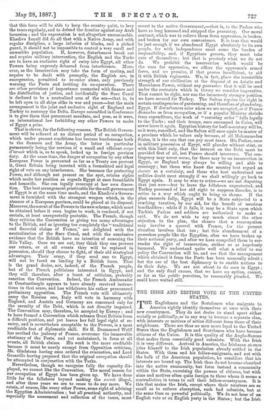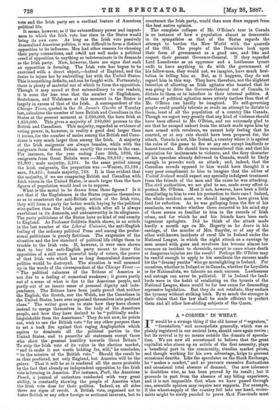THE IRISH AND BRITISH VOTE IN THE UNITED STATES.
THE Englishmen and the Scotchmen who emigrate to America rightly identify themselves at once with their new countrymen. They do not desire to stand apart either socially or politically, or in any way to become a separate clan, with interests or motives of action different from those of their neighbours. There are thus no men more loyal to the United States than the Englishmen and Scotchmen who have become citizens of the Union. It is this quality of the Anglo-Saxons that makes them essentially good colonists. With the Irish it is very different. Arrived in America, the Irishman at once joins himself to the Irish population already settled in the States. With them and his fellow-emigrants, and not with the bulk of the American population, he considers that his interests are bound up. The Irish thus do not become absorbed into the native community, but form instead a community within the State, exercising the powers of citizens, but with aims and motives often quite foreign to these whom it seems a contradiction in terms to call their fellow-countrymen. It is this that makes the Irish, except where their numbers are so small as to enforce absorption, such bad colonists, but at the same time so powerful politically. We do not hear of an English vote or an English party in the States ; but the Irish
vote and the Irish party are a cardinal feature of American political life. It seems, however, as if the extraordinary power and import- ance to which the Irish vote has risen in the States would bring its own cure. As long as the Irish vote passively demoralised American politics, it was difficult to form a distinct opposition to its influence. Men had other reasons for choosing their party connections, and coold not well make a political creed of opposition to anything so indeterminate in its demands as the Irish party. Now, however, there are signs that such
an opposition is forming. The Irish vote has began to be exercised with a direct object,—hatred of England, and the
desire to injure her by embroiling her with the United States. This is something definite, and can be fought with. Fortunately, there is plenty of material out of which to form the opposition. Though it may sound at first extraordinary to our readers, it is none the less true that the number of Englishmen, Scotchmen, and Welshmen at this moment in the States is
largely in excess of that of the Irish. A correspondent of the Chicago Times, quoted in the St. James's Gazette of Tuesday
last, calculates the number of born British and Canadians in the States at the present moment at 2,090,000, the born Irish at 1,850,000. This gives a majority of 240,000 persons to the British and Canadians. This majority, regarded as evidence of voting power, is, however, in reality a good deal larger than it seems, for the number of males among the British and Cana- dians is very much larger than among the Irish. A majority of the Irish emigrants are always females, while with the emigrants from Great Britain exactly the reverse is the case. For instance, for the year ending June 30th, 1886, the emigrants from Great Britain were :—Men, 38,910 ; women, 23,809 ; male majority, 5,101. In the same period among the Irish emigrants, the proportion was :—Women, 25,191 ; men, 24,425 ; female majority, 769. It is thus evident that the majority, if we are comparing British and Canadian with Irish voters in the United States, is much larger than the bare figures of population would lead us to suppose. What is the moral to be drawn from these figures ? Is it not that if the Englishmen in the States organise themselves so as to counteract the anti-British action of the Irish vote, they will form a party far better worth buying by the political wire-pullers than the Irish party, which after all is always exorbitant in its demands, and untrustworthy in its allegiance.
The party politicians of the States have no kind of real enmity to England. As Professor Goldwin Smith shows, in an article
in the last number of the Liberal Unionist, the anti-English
feeling of the ordinary political Press and among the profes- sional politicians is purely fictitious. The exigencies of the situation and the low standard of political life oblige them to truckle to the Irish vote. If, however, it were once shown that to buy the anti-English party meant to incur the opposition of a still more powerful body of voters, the power of that Irish vote which has so long demoralised American politics would be destroyed. The situation is well summed
up in the words of the correspondent of the Chicago Times :- " The political calmness of the Britons of America is not due to a feeling of numerical weakness ; it grows partly
out of a sense of what is due to the American people, and partly out of an innate sense of personal dignity and inde- pendence. The Britons have been justly proud that neither
the English, the Scotch, nor the Welsh, nor the Canadians in the United States, have ever organised themselves into political clans." The writer goes on to state how they have chosen instead to merge themselves in the body of the American people, and how they have desired to be " politically undis- tinguishable from the Americans." They do not now, he points out, wish to use the British vote "for any other purpose than to set a back fire against that raging Anglophobia which aspires to dominate all the political parties in the United States, and to proscribe all statesmen except those who show the greatest hostility towards Great Britain " To strip the Irish vote of its value in the election market, "and to make it not worth bidding for, will," he concludes, " be the mission of the British vote." Should the result be as thus predicted, not only England, but America will be the gainer. That it will be so is rendered all the more probable by the fact that already an independent opposition to the Irish vote is forming in America. For instance, .Puck, the American Punch, a journal of caricature conducted with very great ability, is constantly showing the people of America what the Irish vote does for their politics. Indeed, on all sides there are signs of revolt. A British vote, organised not to foster British or any other foreign or sectional interests, but to
counteract the Irish party, would then soon draw support from the beet native opinion.
The complete collapse of Mr. O'Brien's tour in Canada is an instance of how a population almost as democratic in its sympathies as that of the States regards the attempt to burden the New World with the quarrels of the Old. The people of the Dominion look upon their form of government as a good one, and like and respect their present Governor-General. If they regarded Lord Lansdowne ae an oppressor and a loathsome tyrant unfit to have anything to do with the government of his fellow-men, they would not, we imagine, have much hesi- tation in telling him so. But, as it happens, they do not
regard him in this way. They have, therefore, not the slightest intention of allowing an Irish agitator who boasted that he was going to drive the Governor-General out of Canada, to dictate to them or to interfere in their internal politics. A scheme of political agitation more utterly tactless than that of Mr. O'Brien can hardly be imagined. No self-governing people could possibly tolerate so crude an attempt to dictate to them, least of all the population of a country like Canada. Though we regret very greatly that any kind of violence should have been offered to Mr. O'Brien, and are extremely glad to see that he escaped unhurt from the attack made upon him by men armed with revolvers, we cannot help feeling that he courted, or at any rate should have been prepared for, the attack. Canada is not, like Ireland, a country where it is against the rules of the game to fire at any one except landlords or honest tenants. He should have remembered this, and that his reputation for incitements to violence, and the fiery character of his speeches already delivered in Canada, would be likely enough to provoke such an attack ; and, indeed, that the Canadian crowds opposed to him would have thought it a very poor compliment to him to imagine that the editor of United Ireland would expect any specially indulgent treatment from the friends of the men and the cause he was attacking. The civil authorities, we are glad to see, made every effort to protect Mr. O'Brien. Most it not, however, have been a little humiliating to him to owe his protection to their care? Indeed, the whole incident must, we should imagine, have given him food for reflection. As he was galloping from the fire of his assailants, we wonder whether there occurred to his mind any of those scenes so familiar to him in the records of Irish crime, and for which he and his friends have been such ingenious apologists. Did he think of the attack made hardly a month ago on Mr. Hegerty as be drove in his carriage, of the murder of Mrs. Smythe, or of any of the other well-known incidents of rural life in Ireland under the National League, in which the night attack on a carriage by men armed with guns and revolvers has become almost too common an incident to chronicle, except in cases where death or dangerous injuries are the result? Perhaps Mr. O'Brien may be candid enough to apply to his assailants the excuses made for the "dreamy youths" who go moonlighting in Ireland. For ourselves, whether in Ireland or in Canada, whether for Loyalists or for Nationalists, we tolerate no such excuses. Lawlessness and outrage can never be palliated. If in Ireland the land- lords were in the habit of retaliating on the tyrants of the National League, there would be far lees cause for demanding repressive legislation. But they do not retaliate, they endure the tyranny without striking back. By so much the stronger is their claim that the law shall be made efficient to protect them and all other law-abiding subjects of the Queen.



































 Previous page
Previous page